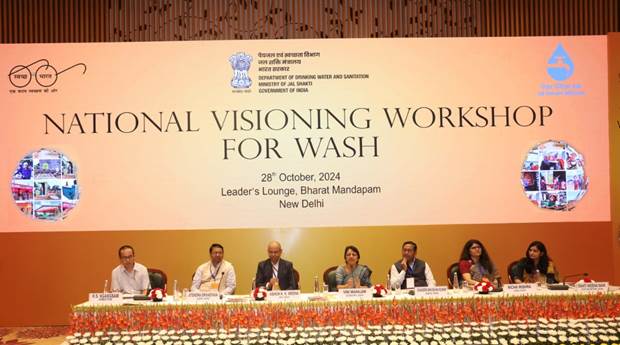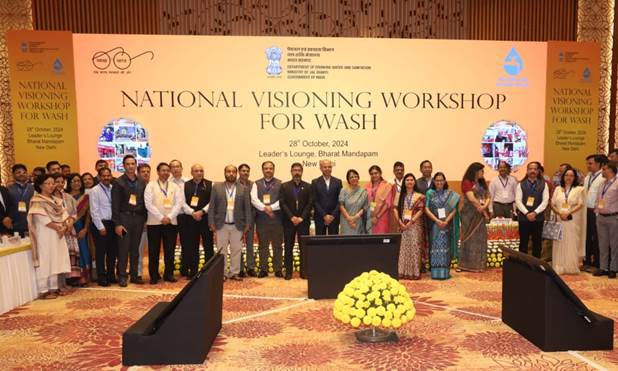DDWS Hosts the National Visioning Workshop for WASH, Engages States/UTs Across Rural India
The Department of Drinking Water and Sanitation (DDWS) today organized a transformative workshop at Bharat Mandapam, New Delhi for the National Visioning Workshop on Water, Sanitation, and Hygiene (WASH). This workshop, marking a pivotal moment in a decade of Swachh Bharat Mission – Grameen (SBMG) and five years of Jal Jeevan Mission (JJM), assessed achievements and forged plans for sustainable community engagement.
The event saw participation from key dignitaries and senior officials, including Smt. Vini Mahajan, Secretary, DDWS; Shri Ashok K.K. Meena, Officer on Special Duty (OSD), DDWS; Dr. Chandra Bhushan Kumar, Additional Secretary & Mission Director, NJJM; Smt. Richa Misra, Joint Secretary & Financial Advisor, DDWS; Shri Jitendra Shrivastava, Mission Director & Joint Secretary, SMBG; and Smt. Swati Meena Naik, Joint Secretary, NJJM. Officials from various states and Union Territories, including Secretaries, Mission Directors, Engineer-in-Chiefs actively participated in the workshop, emphasizing their commitment to advancing WASH goals across the country.
The dual goals of the workshop were to assess progress and refine strategies for the future, with a focus on effective and sustainable community engagement. The assembly also expressed gratitude to Smt. Vini Mahajan. Officials acknowledged her pivotal role in shaping India’s WASH landscape and the seamless alignment of SBM and JJM with national development goals.

(Left to right: Shri K. S. Ngangbam, Director (SBM-V); Shri Jitendra Shrivastava, Mission Director & Joint Secretary; SMBG, Shri Ashok K.K. Meena, Officer on Special Duty (OSD); DDWS, Smt. Vini Mahajan, Secretary, DDWS; Dr. Chandra Bhushan Kumar, Additional Secretary & Mission Director, NJJM; Smt. Richa Misra, Joint Secretary & Financial Advisor, DDWS; Smt. Swati Meena Naik, Joint Secretary, NJJM )
Smt. Vini Mahajan reflected on the progress and challenges faced by JJM and SBM. Acknowledging the need for extension in both time and funding, she advocated for rigorous community engagement and accountability to ensure WASH initiatives resonate deeply with rural citizens. Smt. Mahajan called on state leaders to strengthen local outreach through Information, Education, and Communication (IEC) and Behavior Change Communication (BCC) to secure ownership and sustainability of WASH facilities among communities.
Reflecting on the tangible successes of SBM and JJM, Sh. Ashok Meena emphasized the importance of a community-centered approach for sustainable impact. He expressed optimism about the continued evolution of WASH efforts under the stewardship of Secretary Mahajan, highlighting ongoing initiatives like ODF Plus Model Villages and calling for fresh, people-centric solutions under SBM-G 3.0.
Dr. Chandra Bhushan Kumar underscored the achievements of SBM and JJM, celebrating the programs’ substantial impact over the past decade. He introduced a pilot initiative in collaboration with NITI Aayog to implement WASH solutions in select aspirational districts. State representatives were encouraged to share insights that could further enhance the effectiveness of these programs. Dr. Kumar gave an insightful presentation on ‘JJM: Functionality, IEC, Future’, highlighting the significant expansion of piped water supply across rural India, facilitated by JJM’s shift from a habitation-based to a household-based approach. He emphasized the role of IEC and BCC for the effectiveness of the mission in the rural landscape. He further applauded states like Gujarat and Manipur for their exemplary progress, while stressing the importance of robust financial planning for the upcoming 16th Grants Commission.
Sh. Jitendra Srivastava emphasized the importance of collaboration and convergence across departments to drive WASH progress. He noted the strides made under Smt. Mahajan’s leadership, expressing hope that camaraderie and convergence among MDs and Secretaries would continue to strengthen WASH outcomes. Reporting on the status of SBM-G, Sh. Srivastava cited the substantial increase in ODF Plus Model Villages and advancements in Faecal Sludge Management (FSM) and plastic waste management. He encouraged states to adopt innovative revenue models for sustainable waste management and increase the usage of SBM funds to enhance toilet access and utilization across rural areas.
The workshop witnessed the launch of “Drinking Waterscape in Rural India – Jal Jeevan Mission,” a comprehensive resource documenting JJM’s contributions to the rural water supply landscape.
The workshop concluded with a call to action for state representatives to leverage community leadership and prioritize maintenance of WASH assets. With renewed dedication to sustainable solutions, the Ministry reaffirmed its commitment to achieving universal access to safe water and sanitation for all by 2027. The assembly was further encouraged by the anticipated appointment of Sh. Ashok K.K. Meena as the next Secretary, with hopes that his leadership will elevate the WASH sector to new heights.

